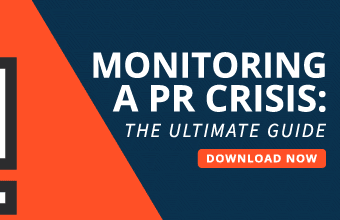After the year we all had, it should come as no surprise that crisis communications has become more important to PR. In fact, 73 percent of respondents to a survey Agility PR Solutions ran in December said so.
There’s a lot that can be said, and has been said, about COVID-19 and its impact. At the very least, the pandemic has given everyone in the PR industry a taste of crisis communications.
Most crises that PR pros handle will never reach the scope of COVID. And while the word “crisis” triggers recollections of big-name brands being painted with a bullseye by the media (however rightly or wrongly), it’s rare for situations to reach that level. Garden variety crises, as one respondent called them, don’t have much of a shot at claiming a headline, but that doesn’t make them any less of a threat to the impacted person, brand, or company.
Whether you’re facing a headline-snatching or garden variety crisis, there are three broad stages which we’re calling Prepare, Respond, and Resolve. Among the answers from our survey’s participants, some trends emerged in alignment with these three stages.
Prepare
Read any crisis comms book, guide, or article, and you’ll see reference to a crisis plan or framework. Our own Essential Crisis Communications Prep Guide & Workbook says, “In the world of communications, being prepared for a crisis before it happens will determine how quickly your company or clients can bounce back.”
A thorough crisis plan lays the foundation for a successful response, but one struggle during this planning stage, as identified by survey respondents, is getting leadership and/or client buy-in on the process. The belief that their brand is untouchable or that you can’t prepare for the unexpected may be preventing them from adopting or prioritizing a proactive approach.
It’s undeniable that there will always be a reactive element to a crisis response (we can’t see the future after all), but as they say, the best defense is a good offense. Having certain measures in place will reliably ensure you’re able to pull a response together as quickly and seamlessly as possible. This stage may seem like an unnecessary burden—what if that unexpected crisis never happens? Spoiler alert: it will, but having a crisis plan ready to go is like having a foundation of stone instead of sand.
Respond
The best handled crises are the ones you’ve never heard of—not in traditional media, not on social media, not from anyone.
However, if word does get out, knowing how to respond (as in what you might say) brings up a lot of questions and concerns. The following list, organized under the five Ws of journalism, were all mentioned by respondents.
What do we say? When there’s a lack of knowledge and the situation is changing day to day, or even minute to minute, knowing what to say is critical… and difficult.
Who should say it? Although it would seem to make sense that the most powerful person in the company should speak, the most ideal spokesperson may not always be the CEO. The answer to this question could be determined by “ownership”. Who is going to take responsibility for the crisis?
When should we say it? Immediately? When everything’s sorted out? They both have their risks. Speaking too early and without all the facts may create opportunity for the wrong narrative to hit the press and then correcting it becomes a chore, if not impossible. Speaking after the fact again runs the risk of the wrong narrative hitting the headlines (because it won’t be yours) and you may look like you haven’t taken matters seriously or were trying to bury the problem.
How should we say it? Leadership may want to project a sanitized version of events to the audience, while the PR agency handling the situation may recommend radical honesty and transparency.
Where should we say it? Keeping your crises from the media is usually desirable, but a crisis must be addressed somewhere, so where to do it? Which platforms are the most appropriate? Is it only to internal audiences, or do your external audiences need to be informed as well?
Resolve
In the resolve stage, you may still be wrapping up loose ends, but you’re comfortable enough to take a breath. Part of this stage is evaluating the total impact of your various actions and activities and therefore it’s essential, especially in the current landscape, to consider the role social media played.
People are given nearly unlimited ability to say whatever they want, whenever they want, thanks to social media. The freedom of these platforms means that you can almost immediately lose control of a situation and are left in the dust trying to combat negative images, correct false headlines, provide context, and respond to commentators.
We don’t claim to be crisis experts at Agility, but we’re fortunate that we get to partner with them to provide you the knowledge you need to become a crisis master yourself. On March 25 and 26, join your peers at the first Crisis Comms Mastery virtual summit—for free. Our lineup of speakers—crisis comms experts, authors, agency owners and more—have put together 10+ knowledge-packed presentations for your benefit. We hope you’ll come take a look.








